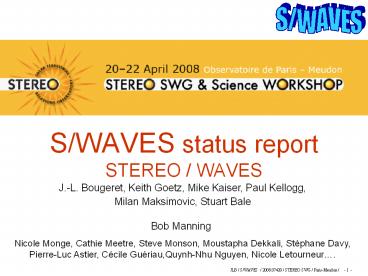S/WAVES status report STEREO / WAVES - PowerPoint PPT Presentation
Title:
S/WAVES status report STEREO / WAVES
Description:
Nicole Monge, Cathie Meetre, Steve Monson, Moustapha Dekkali, St phane Davy, Pierre-Luc Astier, C cile Gu riau,Quynh-Nhu Nguyen, Nicole Letourneur... – PowerPoint PPT presentation
Number of Views:64
Avg rating:3.0/5.0
Title: S/WAVES status report STEREO / WAVES
1
S/WAVES status reportSTEREO / WAVES
J.-L. Bougeret, Keith Goetz, Mike Kaiser, Paul
Kellogg, Milan Maksimovic, Stuart Bale
Bob Manning
Nicole Monge, Cathie Meetre, Steve Monson,
Moustapha Dekkali, Stéphane Davy, Pierre-Luc
Astier, Cécile Guériau,Quynh-Nhu Nguyen, Nicole
Letourneur.
2
S/WAVES
3
- S/WAVES instrument status
- Calibrations and direction finding status
- Science data products and data access
- Science status
- Research areas
- Publications and talks
- Prospects
- E/PO
S/WAVES team meeting on Wednesday, April 23
4
S/WAVES instrument status
- Both instruments continue to function nominally
- We continue to see lots of dust
- especially prominent and puzzling on A.
- The operations team at APL continues to give very
good service - in getting bits to the ground
- in getting commands sent up
- in dealing with "situations" from time to time.
5
Calibrations and direction finding status
Inter calibration between receiver 1 2, on
STB Fundamental for direction finding (Auto
cross-correlations between two antennas)
Ratio close to 1
Agreement to about 0.5 dB
6
Science data products and data access
- Data products
- At GSFC
- At CDPP, Toulouse
- http//cdpp.cesr.fr/
- Ground-based datahttp//secchirh.obspm.fr-
images of radio corona, films, spectra- includes
3-hour zoom on S/WAVES HFR data
S/WAVES
7
Science status research areas
- Tracking of radio events (Sun is very quiet)
- Electron streams (type III) sporadic, storms
- IP Shock waves (type II), CME associated
- Coordinated science - SECCHI, IMPACT, PLASTIC
- WIND and RHESSI - Magnetospheric physics
- In situ micro-physics, turbulence
- Serendipitous science results
- Strong whistler waves in the radiation belts
- Interplanetary dust
8
Tracking interplanetary type II shock events
- The Sun
- continues
- to be quiet!
- Still,
- we have observed a few type IIs
9
In situ micro-physics TDS studies
S / W A V E S
- Waveform snapshots S/WAVES 130
ms WIND/WAVES 15 ms - Several studies (Minnesota, Berkeley, Boulder,
Meudon, Sydney) - Wave coupling
- SGT
- Solitary waves
- Eigenmodes
- Collaboration with IMPACT, PLASTIC
- Direct access to basic plasma radiation
mechanisms and fundamental plasma physics
processes
10
Publications, talks and topics
- http//www.lesia.obspm.fr/plasma/SWAVES/fr/pages/r
esultats/publications.php - Topics
- Type III direction finding first results
(Reiner, Cecconi, Maksimovic et al.) - Type III emission diagram (Bonnin et al.)
- Type III storms (Eastwood et al.)
- Type III - X-rays with RHESSI (Krucker et al.)
- Foreshock Langmuir waves and electrons (Pulupa et
al.) - SW turbulent correlation lengths (Bale et al.)
- Dust (Kaiser, Goetz et al.)
- Ne from shot noise (Zouganelis et al.)
- Langmuir waves mode conversion (Henri et al.)
- Langmuir waveforms modelized as linear eigenmodes
(Ergun et al.) - AKR visibility emission diagram (Panchenko et
al., Lamy et al.)
11
Websites
- General http//www.lesia.obspm.fr/plasma/STEREO.h
tmlhttp//swaves.gsfc.nasa.gov/ - Distribution listswaves_at_listserv.gsfc.nasa.govs
waves_at_sympa.obspm.fr - Secure website and forumhttps//sympa.obspm.fr/w
ws/info/swaves
12
Science prospects 90 and beyond
- Role of WIND/WAVES
- Radio and white light orthogonal
- Radio sees head front events best
- White light sees limb events best
- Access to 360 radiation pattern
- Evolution of the dust question
13
E/PO
- In France and Europe
- Organization of IHY Open Door Day (10 June 07)
- Participation to exhibits on SpaceWeather
- Conferences (schools, general public,)
- More to come































